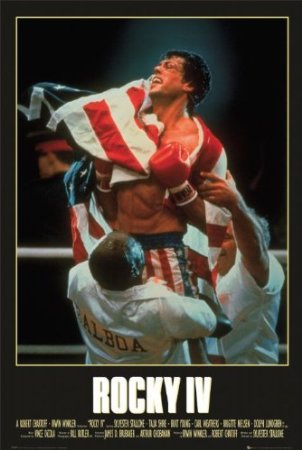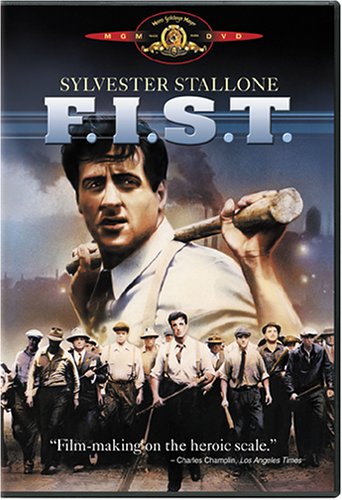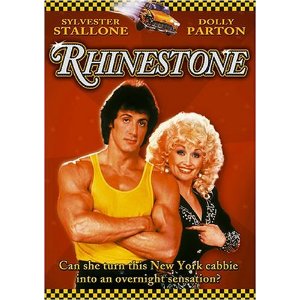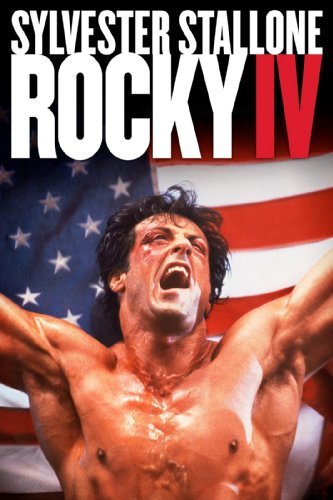|
STALLONE’S CONQUESTS
By Paul Freeman [1986 Interview] Like Rocky Balboa, Sylvester Stallone has been battered and bloodied time after time. But when the final bell rings, you inevitably find him still standing, arm raised in triumph. Stallone tried a longshot with “Rhinestone.” It went right in the tank. Some said he was all washed-up. But he quickly got up off the canvas and scored a one-two punch with “Rambo: First Blood, Part II” and “Rocky IV.” Stallone’s incredible success isn’t just a matter of luck. He knows when to stop gambling and go for the sure thing. He knows what the public wants. And he knows how to give it to them. I’m speaking with Stallone as “Rocky IV,” the latest chapter in the “Rocky” saga, is nearing release on home video. Stallone and his entourage enter the Beverly Wilshire Hotel in Beverly HIlls. As he approaches, his hand is extended graciously, but his eyes betray a trace of wariness. The press has been known to hit him below the belt. Stallone is much smaller than his screen presence would lead you to expect. But his compactness only serves to heighten his handsomeness and intensity. His readiness to laugh at himself takes the edge off his bravado. Before moving into the heavyweight class, Stallone showed strength with supporting roles in such films as “Bananas,” “The Lords of Flatbush,” “Death Race 2000,” “Capone,” “The Prisoner of Second Avenue” and “Farewell My Lovely.” After bursting through to the star ranks with “Rocky,” he did “F.I.S.T.,” a labor union story that was KO’d at the box office. “The subject matter was too historical,” says Stallone, in his low, somnambulistic voice. “Also, there wasn’t any action in the second half. The first half, I think, really worked. I suggested that they end the movie right there.”
“F.I.S.T.” was followed by “Paradise Alley,” which also went down for the count swiftly. The delightfully quirky film was set in the ‘40s and concerned three brothers who hoped the wrestling game would be their ticket out of Hell’s Kitchen. Stallone starred, wrote, directed and sang the title song. “I’ve tried to do things off the beaten path, like ‘Paradise Alley,’ and they sure didn’t go over well. It’s a risky proposition, like playing blackjack in Vegas and drawing on 21. v “I’ve always wanted to do the story of Edgar Allan Poe, but I just know it won’t work. It’s rough to experiment with $20 million that doesn’t belong to you. “The life of an author could be boring, but what Poe writes about would be interesting. I would incorporate the Ken Russell style of moving in and out of Poe’s fantasies. It would be almost a horror story. “I wanted to play Poe myself, but I don’t think I could pull it off anymore. I’m not physically right for it. “I’m basically a writer. Yet I don’t look like a writer. Being a certain physical type has completely cut off about 60 percent of the roles. I’ve come to the realization that I must really go with my long suit. “We have a certain number of years in the business. And it is a business. Great art hangs in the Louvre. It’s very hard to make great art through a collective effort, which is what film really is. There are too many chefs.” When it comes to the business of making films, Stallone is sharper than the blade of a survival knife. “I try not to fool around and take risks with the studio’s money and their trust, just for my ego gratification. I’m not going to do Chekhov. “I’ve looked at Clint Eastwood and seen what worked for him. When he vacillated from that, he got killed. It’s not that he’s not a good actor. It’s just that the audience has a rapport for a certain character. When they pay five dollars, they don’t want to all of a sudden see a guy coming out in a powdered wig. They just want to see what they expect. It fits. It’s comfortable. It’s like being at home.” Though Stallone didn’t don a powdered wig for “Rhinestone,” he didn’t seem at home playing broad comedy and singing country music. “It was a reverse ‘Pygmalion,’ a ‘My Fair Man,’ you might say. The opportunity to work with Dolly Parton was just too tempting. I like working with other established personalities and the opportunity hasn’t come along very much for me. So, when this chance came, I grabbed it. “Competition brings out the best in you. When you don’t have it, it’s like working out by yourself in the gymnasium - you’re not going to make super gains. It’s like the ancient axiom: If your enemy is great, then it’s a great victory, when you slay him. If he’s nothing, you’re no warrior; it’s no big deal. It’s the same thing with the calibre of actor you’re working with.”
Critics slew both Stallone and Parton. Stallone has learned to accept the harshest disparagement. “I really believe, if you lay it out there, you have to be able to take the heat. I used to take great offense at hostile reviews, when they were directed at me personally, not the work. But now, I’ve developed a thick skin for it. If people are going skewer me, there’s nothing I can do about it. I just don’t read it anymore. If they're good, I get an overblown ego. If they’re bad, I get a deflated ego. So it’s a no-win situation.” Reminded of the critical blasts he absorbed for “Rhinestone,” Stallone remarks, “It was safer and simpler walking through the jungle, carrying a gun.” That’s a reference to “First Blood,” his first non-”Rocky” blockbuster. He hadn’t foreseen the film’s success. “I was amazed. When I first saw it, it was two-and-a-half hours long. I begged to buy it back. I said, ‘Please don’t release this movie!’ It was really terrible. It was long. It was boring. It was just so pontificating. “We cut it down to 92 minutes and it became a different movie. All the preachy parts went out. Lots of dialogue was cut out. What we ended up with was a great action film. It delivered a message, but with no preaching in it. Everyone else spoke. With my character, the action spoke for itself. “The more confident you become with a script, the less dialogue you want. Less is better in everything... except bank accounts. I just don’t like long, rolling speeches. I find I do better with quick jabs. The less I speak, the better off I am.” Stallone did more killing than talking in “Rambo: First Blood, Part II.” “It’s back in Vietnam. There’s supposedly billions of dollars in war retribution that were never paid to Hanoi. And so, they never released the M.I.A.s. All negotiations have long since broken down. There’s a lot of pressure from the League of Families and Presidential committees. So I go back there to find the men. But it was all a scam. I’m betrayed. I’m abandoned. I'm tortured. I escape. Now, it’s a fight to get back to the people who originally set this bogus mission up. Even though it’s in the action genre, like the first one, there are some underlying sociological messages to it. “I believe every soldier there felt they did their best. It was the coach that let them down. They didn’t lose the war. The war lost them. “I got tremendous response from the vets. The Rocky character is very fictional. He’s gone beyond, into a folk legend type of thing. Rambo is very, very real and so pertinent, so identifiable. A lot of Vietnam vets have seen this as a signpost to better times ahead. After the first movie, a lot of them thanked me for it and said they wanted to see more of it, because it’s their story.”
“Rocky,” the underdog who overcomes all obstacles, is Stallone’s story. After a couple more sequels, Rocky will be fighting middle age. “It gets more difficult each time. I have mixed feelings about doing a ‘Rocky V,’ but ‘Rocky IV,’ was a really good story. It’s basically a take-off of the Max Schmeling-Joe Louis fight in 1938, where two nations are at each other’s throats and the fight has great importance to it. “Rocky no longer has his own internal problems to contend with. He’s basically satisfied there. Now it’s a matter of dealing on an international basis, where he’s being used as a pawn. “Russia enters the free market in boxing. Their fighter is a real test tube type. He’s totally raised in a laboratory. He fights Apollo in an exhibition match, three rounds - it’s supposed to be safe. The Russian demolishes him - brain hemorrhage and everything. So I’ve got to get the bastard. And it turns into a real political vendetta - just the way the Olympics basically are - warfare with a stop watch. “Rocky no longer follows a pattern of a normal human being’s existence. He’s getting stronger and smarter, the more punches he takes. It’s strange. After ‘Rocky I,’ he was no longer just a boxer. He represented a lifestyle, a philosophy, a go-get-ism, an American Dream-ism. “It’s not entrenched in reality. The punches and blood look real, but what we’re looking at basically is pure symbolism. These are statement movies. They say that, if you work hard, no matter what the odds, you will better yourself.” |



